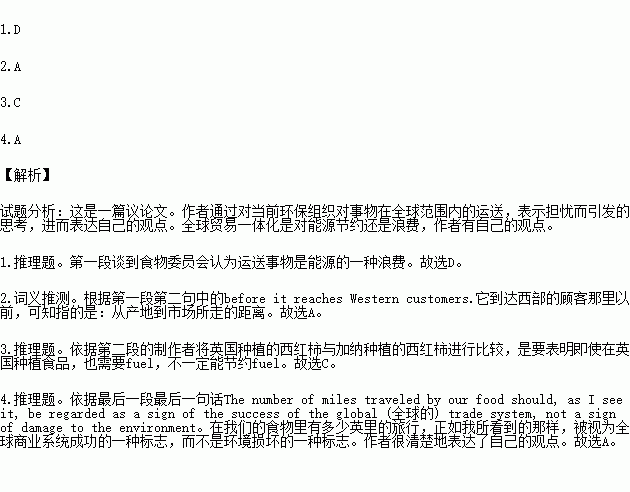题目内容
An environment group called the Food Commission is unhappy and disappointed because of the sales of bottled water from Japan. The water, it angrily argues in public, has traveled 10,000 “food miles” before it reaches Western customers. “Transporting water half-way across the world is surely the extremely stupid use of fuel when there is plenty of water in the UK.” It is also worried that we are wasting our fuel by buying prawns from Indonesia (7,000 food miles) and carrots from South Africa (5,900 food miles).
Counting the number of miles traveled by a product is a strange way of trying to tell the true situation of the environmental damage done by an industry. Most food is transported around the world on container ships that are extremely energy-efficient. It should be noted that a ton of butter transported 25 miles in a truck to a farmers’ market does not necessarily use less fuel on its journey than a similar product transported hundreds of miles by sea, Besides, the idea of “food miles” ignores the amount of fuel used in the production. It is possible to cut down your food miles by buying tomatoes grown in Britain rather than those grown in Ghana; the difference is that the British ones will have been raised in heated greenhouses and the Ghanaian ones in the open sun.
What is the idea of “food miles” does provide, however, is the chance to cut out Third World countries from First World food markets. The number of miles traveled by our food should, as I see it, be regarded as a sign of the success of the global trade system, not a sign of damage to the environment.
1.The Food Commission is angry because it thinks that .
A. UK wastes a lot of money importing food products
B. some imported goods cause environmental damage
C. growing certain vegetables damages the environment
D. people waste energy buying food from other countries
2.The phrase “food miles” in the passage refers to the distance .
A. that a food product travels to a market
B. that a food product travels from one market to another
C. between UK and other food producing countries
D. between a Third World country and a First World food market
3.By comparing tomatoes raised in Britain and in Ghana, the author tries to explain that .
A. British tomatoes are healthier than Ghanaian ones
B. Ghanaian tomatoes taste better than British ones
C. cutting down food miles may not necessarily save fuel
D. protecting the environment may cost a lot of money
4.From the passage we know that the author is most probably .
A. a supporter of free global trade
B. a member of the Food Commission
C. a supporter of First World food markets
D. a member of an energy development group
Dogs Don't Tell Jokes - By Louis Sachar
Twelve-year-old Gary Boone knows he was born to be a comedian. He never stops joking, regardless of the fact that nobody laughs much and his classmates think he is stupid. Therefore he had no real friends at school. Due to being laughed at by his classmates, Gary Boone thought winning the school talent show would be his dream of proving himself to be a real comedian, but on the big night his dream went wrong with funny results. | Winners Never Quit - By Mia Hamm
Mia Hamm, American soccer champion, tells a true-to-life inspiring story of learning that winning and losing aren't as important as being part of a team. More than anyone, soccer superstar Mia Hamm knows the value of teamwork. She shares this lesson, paired with energetic pictures by Carol Thompson, and this story is perfect for soccer kids and their soccer moms. |
Shack let on s Incredible Voyage - By Alfred Lansing
The astonishing adventure of polar explorer Ernest Shackleton's survival for over a year on the ice-bound Antarctic seas, as Time t magazine put it, "defined heroism". To write the authoritative story, Lansing consulted with ten of the surviving members and gained access to diaries and personal accounts by eight others. The book has a first-hand account, expanded with maps and illustrations especially for this edition. | The Alchemist - By Paulo Coelho
The Alchemist, by Paulo Coelho, continues to change the lives of its readers forever. It tells the magical story of Santiago, an Andulusian shepherd-boy (牧童) who desires to travel in search of treasure. The story of the treasures Santiago finds along the way teaches us about the essential wisdom of listening to our hearts and above all, following our dreams. |
1.From Shackletoris Incredible Voyage, we know the main character ______.
A. is a writer for Time magazine
B. is a survival of one polar exploration
C. has left a lot of diaries and accounts
D. has formed a close friendship with Alfred Lansing
2.If you want to know more about teamwork, you can read ______.
A. Dogs Don't Tell Jokes B. Shackletoris Incredible Voyage
C. Winners Never Quit D. The Alchemist
3.What do we know about The Alchemist?
A. It has an everlasting influence on its readers.
B. It gives people magical power over their dreams.
C. It tells a story of how to find treasures.
D. It is mainly about the wisdom of listening to others.






